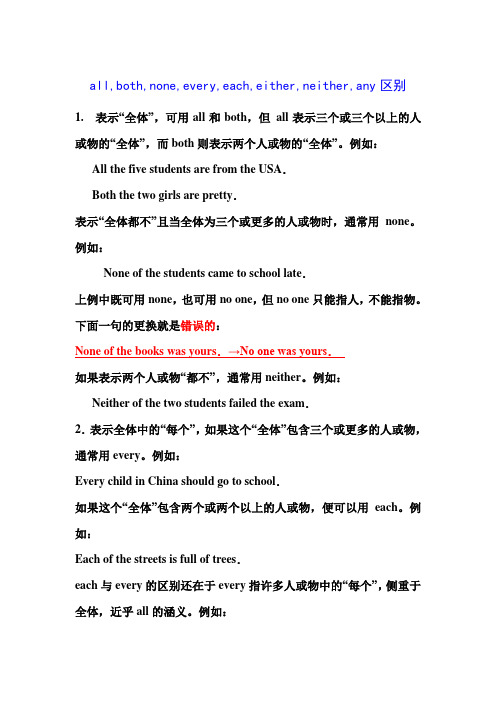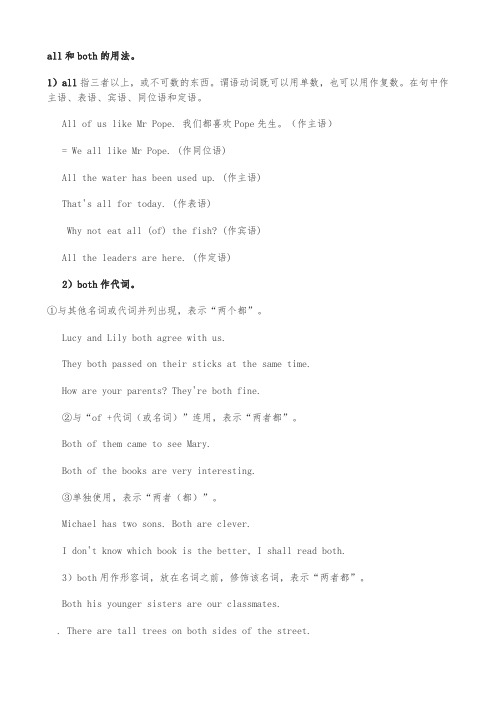all both用法辨析
- 格式:doc
- 大小:22.00 KB
- 文档页数:1

all,both,none,every,each,either,neither,any区别1. 表示“全体”,可用all和both,但all表示三个或三个以上的人或物的“全体”,而both则表示两个人或物的“全体”。
例如:All the five students are from the USA.Both the two girls are pretty.表示“全体都不”且当全体为三个或更多的人或物时,通常用none。
例如:None of the students came to school late.上例中既可用none,也可用no one,但no one只能指人,不能指物。
下面一句的更换就是错误的:None of the books was yours.→No one was yours.如果表示两个人或物“都不”,通常用neither。
例如:Neither of the two students failed the exam.2.表示全体中的“每个”,如果这个“全体”包含三个或更多的人或物,通常用every。
例如:Every child in China should go to school.如果这个“全体”包含两个或两个以上的人或物,便可以用each。
例如:Each of the streets is full of trees.each与every的区别还在于every指许多人或物中的“每个”,侧重于全体,近乎all的涵义。
例如:Every student passed the exam.=All the students passed the exam.而each则指许多人或物中的“各个”,侧重于个别。
例如:Each student should have his own way to study.3.表示全体中的“任何一个”,也要看这个“全体”是包括三个或更多,还是只包含两个。

英语单词all和both、every和each的用法英语单词all和both、every和each的用法(1)all和both的用法:all指三者或三者以上的人或物,用来代替或修饰可数名词;也可用来代替或修饰不可数名词。
both指两个人或物,用来代替或修饰可数名词。
all和both在句子中作主语、宾语、表语、定语等。
如:I know all of the four British students in their school.(他们学校里的四个英国学生我全认识) / --Would you like this one or that one? –Both.(你要这个还是那个?两个都要。
)all和both既可以修饰名词(all/both+(the)+名词),也可以独立使用,采用“all/both + ofthe +名词(复数)”的'形式,其中的of 可以省略。
如:All (of) (the) boys are naughty.(是男孩都调皮)(2)every和each用法:every是形容词,只能作定语修饰单数名词,意思是“每一个”,表示整体概念;each是形容词、代词,可用作主语、宾语、定语等,意思是“每个”或者“各个”,表示单个概念;each可以放在名词前,可以后跟of短语,与动词同时出现时要放在“be动词、助动词、情态动词”之后或者行为动词之前every和each都用作单数理解,但是下文中既可以用单数的代词(如he/him/his)也可以用复数的代词(如they/them/their)替代。
如:Every one of the students in his class studies very hard.(他班上每个学生学习都很用功) / They are very busy. Each of them has something to do.(他们很忙,人人都有要做的事) 【英语单词all和both、every和each的用法】。

all和both的用法。
1)all指三者以上,或不可数的东西。
谓语动词既可以用单数,也可以用作复数。
在句中作主语、表语、宾语、同位语和定语。
All of us like Mr Pope. 我们都喜欢Pope先生。
(作主语)= We all like Mr Pope. (作同位语)All the water has been used up. (作主语)That's all for today. (作表语)Why not eat all (of) the fish? (作宾语)All the leaders are here. (作定语)2)both作代词。
①与其他名词或代词并列出现,表示“两个都”。
Lucy and Lily both agree with us.They both passed on their sticks at the same time.How are your parents? They're both fine.②与“of +代词(或名词)”连用,表示“两者都”。
Both of them came to see Mary.Both of the books are very interesting.③单独使用,表示“两者(都)”。
Michael has two sons. Both are clever.I don't know which book is the better, I shall read both.3)both用作形容词,放在名词之前,修饰该名词,表示“两者都”。
Both his younger sisters are our classmates.. There are tall trees on both sides of the street.。

专四both和all 易错题摘要:一、引言1.专四考试的重要性2.both和all的用法区别二、both的用法1.both的词义2.both与all的关联用法3.both的固定搭配三、all的用法1.all的词义2.all与both的关联用法3.all的固定搭配四、易错题解析1.both和all的选择题2.both和all的填空题3.both和all的改错题五、总结1.both和all的用法比较2.易错题的解题技巧3.提高专四考试的策略正文:一、引言作为一名学习英语的学生,我们都知道英语专业四级(简称专四)考试是对我们英语能力的重要检验。
而在专四考试中,有一些题目涉及到both和all 的用法,让许多同学感到困惑。
本文将对both和all的用法进行详细的解析,帮助大家更好地理解和掌握这两个词的用法。
二、both的用法1.both的词义:both表示“两者(都)”,通常用于修饰名词,表示两个事物都包括在内。
2.both与all的关联用法:当all修饰名词时,它表示“三者或三者以上都”,而both修饰名词时,表示“两者都”。
因此,我们可以认为both是all的一种特殊情况。
3.both的固定搭配:常见的搭配有both...and...(两者都...),either...or...(要么...要么...)等。
三、all的用法1.all的词义:all表示“全部,整个”,可以修饰名词,表示所有的成分都包括在内。
2.all与both的关联用法:all表示“全部”,而both表示“两者”,因此,当涉及到多于两个事物时,我们通常使用all。
3.all的固定搭配:常见的搭配有all...not...(全部...不...),all the same (仍然,依旧)等。
四、易错题解析1.both和all的选择题:这类题目通常会给出一个句子,让我们选择正确的词填空。
解答这类题目时,我们需要根据句子的意思和修饰的名词数量来判断使用哪个词。

all, both, every, each, either, neither的区别1.all, both同属前位限定词,但all可以与三类名词搭配,both只能与复数可数名词搭配,从意义上讲both指两者,all指三者或三者以上。
如:How much time will you take for all this work?All children can be naughty sometimes.I got both these vases in Spain.Both cats are asleep.all和both用于否定时表示部分否定。
例如:I cannot promote both of you.我不能使你们两个都提升。
All flowers in his garden are not red.他花园里的花并非都是红色的。
Both (of them) are not my brothers.他们两个之中,只有一个是我的兄弟。
另外,表示部分否定的词还有every (everyone)。
例如:Every man can not be a poet.并非人人都可以成为诗人。
要表达全部否定要用none / no (nobody) , neither, either等。
例如:I cannot promote either of you.你们两个我都不能提拔。
No flower in his garden is red.他花园的花都不是红的。
2.all和every从意义上十分相近,都用来泛指人或物,然而两者各自与名词搭配的类别不同,every只能与单数可数名词连用。
如:All Mondays are horrible.(= Every Monday is horrible. )all后可以跟the或this, my等限定词,而every却不行。
例如:All the boys of this class are able to run faster than their teacher.试比较:She was here all day.她在这里呆了一整天。

专四 both和all 易错题(原创实用版)目录1.专四考试的概述2.both 和 all 的含义和用法3.解析 both 和 all 的易错题4.如何避免在考试中犯错正文一、专四考试的概述专四,全名为大学英语四级考试,是中国大学英语教学的一种水平测试,旨在评估非英语专业大学生的英语应用能力。
该考试每年举行两次,分别在 6 月和 12 月。
通过专四考试,不仅可以证明自己的英语水平,还能为以后的就业和升学提供有力的语言能力证明。
二、both 和 all 的含义和用法1.bothboth 是一个代词,表示“两者都”,常用于两者之间的肯定句中。
例如:- Both of them like to play basketball.(他们两个都喜欢打篮球。
)2.allall 是一个副词,表示“三者或三者以上都”,常用于肯定句和疑问句中。
例如:- All of them are from Beijing.(他们都来自北京。
)- Do all of them like to travel?(他们都喜欢旅行吗?)三、解析 both 和 all 的易错题在专四考试中,both 和 all 的用法常常出现在选择题、填空题和改错题中。
以下是一些易错题的解析:1.选择题:下列哪个句子的 both 和 all 使用正确?A.Both of them are students.B.All of them are students.C.Both of them aren"t students.D.All of them aren"t students.答案:A解析:both 表示两者都是,all 表示三者或三者以上都是。
此题中,由于是指两者,所以应使用 both。
2.填空题:他们都是来自上海的学生,请用 both 和 all 填空。
答案:Both of them are students from Shanghai.解析:由于是两者都来自上海,所以应使用 both。
all, both, every, each, either, neither的区别1.all, both从意义上讲both指两者,all指三者或三者以上。
如:All flowers in his garden are red.他花园里的花都是红色的。
My parents are both doctors我的父母都是医生。
(父母两者)另外,表示部分否定的词还有every (everyone)。
例如:Every man can not be a poet.并非人人都可以成为诗人。
要表达全部否定要用none / no (nobody) , neither, either等。
例如:I cannot promote either of you.你们两个我都不能提拔。
No flower in his garden is red.他花园的花都不是红的。
2.all和every从意义上十分相近,都用来泛指人或物,然而两者各自与名词搭配的类别不同,every只能与单数可数名词连用。
如:All Mondays are horrible.(= Every Monday is horrible. )all后可以跟the或this, my等限定词,而every却不行。
例如:All the boys of this class are able to run faster than their teacher.试比较:She was here all day.她在这里呆了一整天。
She was here every day. 她天天都在这里。
3.every和each同属中位限定词,都可与单数名词连用,且意义相近,表示‘每个’,然而every和each并不完全一样,every强调整体概括,each则表示个别概念。
例如:Each day is better than the one before.一天比一天好。
Every player was in good form.每个运动员都处于最佳状态。
all的意思是“全部”,both的意思是“两个都”,当用not对其否定的时候,不论not 置于all和both的前面,还是用来否定动词,要注意是部分否定,例如:All the girls will take part in the singing competition.所有的女孩子都要参加唱歌比赛。
All of us decided to keep on climbing the mountain.我们所有人都决定继续爬山。
注意用not否定时,句子含义的变化,例如:Not all the girls will take part in the singing competition.不是所有的女孩子都去参加唱歌比赛。
(部分否定)也可以说:All the girls won't take part in the singing competition.不是每个女孩子都要去参加唱歌比赛。
(部分否定)Not all of us decided to keep on climbing the mountain.我们当中不是每个人都决定继续爬山。
(部分否定)也可以说:All of us didn't decide to keep on climbing the mountain.我们不是每个人都决定继续爬山。
(部分否定)both的部分否定用法同上。
如果想用完全否定,该怎样说呢?all的完全否定用no或none,both的完全否定用neither。
例如:None of them believe this.他们中没人相信这个。
(完全否定)There is no one believes this.没人相信这个。
(完全否定)Neither he and she would buy this book. 他俩没人打算买这本书。
(完全否定)Neither of them likes opera.他们两个都不喜欢歌剧。
all, both, every, each, either, nei ther ,none用法
1. all 意为“全部”,用于三者或三者以上,其完全否定形式用none,意为“没有一个”。
None 作主语时,谓语可用单数,也可以用复数。
2. both 意为“两者都”,用于两者,其完全否定形式用neither,表示“两个中任何一个都不是”。
3. either 表示“两个人或物中的任何一个”。
4. each 意为“每一个”,指二者或二者以上的人或物中的“每一个”,
可作主语,宾语,定语和同位语。
5. every 意为“每一个”,指三者或三者以上的人或物中的“每一个”,只用作定语。
every 除了表示“每一”以外,还可以表示“每隔......”。
如:
every five mimutes 每隔五分钟
6. neither的用法与either相同,是either的否定形式,表示”两者都不.......“;
在句中可以用作主语,宾语,定语;做主语时,注意谓语动作不要再否定。
all, both, every, each, either, neither的用法all, both, every, each, either, neither的用法1.all, both同属前位限定词,但all可以与三类名词搭配,both只能与复数可数名词搭配,从意义上讲both指两者,all指三者或三者以上。
如:How much time will you take for all this work?All children can be naughty sometimes.I got both these vases in Spain.Both cats are asleep.all和both用于否定时表示部分否定。
例如:I cannot promote both of you.我不能使你们两个都提升。
All flowers in his garden are not red.他花园里的花并非都是红色的。
Both (of them) are not my brothers.他们两个之中,只有一个是我的兄弟。
另外,表示部分否定的词还有every (everyone)。
例如:Every man can not be a poet.并非人人都可以成为诗人。
要表达全部否定要用none / no (nobody) , neither, either 等。
例如:I cannot promote either of you.你们两个我都不能提拔。
No flower in his garden is red.他花园的花都不是红的。
2.all 和every从意义上十分相近,都用来泛指人或物,然而两者各自与名词搭配的类别不同,every只能与单数可数名词连用。
如:All Mondays are horrible.(= Every Monday is horrible. )all后可以跟the或this, my等限定词,而every却不行。
all & both辨析
all(用于三者或三者以上)与 both(用于两者)在用法上有很多相似之处,现放在一起讲述如下:1. 与定冠词、指示代词、形容词性物主代词、名词所有格等连用时,应放在这些词之前而不是之后,并且一般还可在它们之间加介词of。
如:
all / both (of) the books 所有这些/这两本书
all / both (of) her children 她所有的/这两个孩子
all / both (of) these vases 所有这些/这一对花瓶
2. 在人称代词之前只能用 all of / both of (不能没有of),而在单独使用的名词(即没有其它词修饰)之前只能用 all/ both (不能有 of)。
如:
误:all / both us
正:all / both of us 我们所有的人/两人
误:all / both of children
正:all / both children 所有/两个孩子
3. 用作主语同位语时,其位置不一定是紧跟在主语之后,而通常放在行为动词之前,特殊动词之后。
如:
They were all (both) asleep. 我们都(俩都)睡着了。
We have all (both) read the book. 我们都(俩都)读过这本书。
注:若特殊动词单独使用,则 all/both 应放在它们之前。
如:
How kind they all are! 他们都是多么友好啊!
You haven’t been there, but we both have.你们没去过那儿,但我们俩去过。
4. all 除表示具体的人或物外,还可指抽象的事物或现象(常译为“一切”),此时应注意:all 一般单独使用(即其后不接名词也不接 of)且表示单数意义(注:both 无此用法)。
如:All goes well. 一切顺利。
All is not gold that glitters. 发亮的东西不一定都是金子。
比较:
All is silent成籁俱寂。
(指抽象的现象)
All are silent人人都沉默不语。
(指具体的人)。